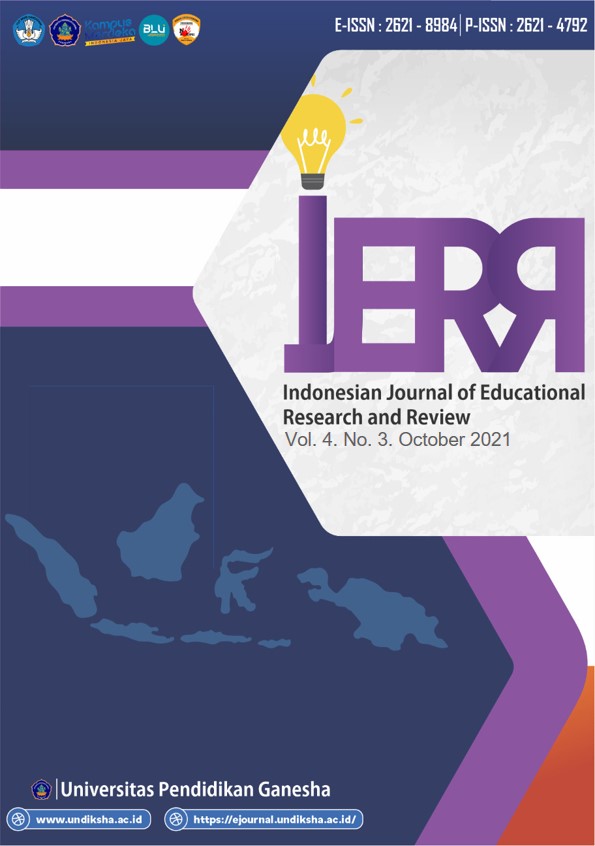JARET: A Human Assistive A.I. Agent for Goal Review and Time Management
DOI:
https://doi.org/10.23887/ijerr.v4i3.41630Keywords:
Assistive AI, Time Management, Self-Regulated Learning, Cognitive Load Theory, Agent Design, Constraint Satisfaction, Scheduling, PlanningAbstract
Many students do not set goals or plan their time weekly (due to lack of ability, perceived difficulty, and other reasons) resulting in procrastination, stress, and lower academic performance. This paper presents the design methodology and considerations for a human assistive AI agent that helps students review and plan for study goals, reducing a large abstract problem into a set of simpler review tasks. J.A.R.E.T. (Just A Recommender Engine for Time) uses key principles from Self-Regulated Learning and Cognitive Load Theory in an interactive system that guides students through focused goal review and planning tasks, then uses a constraint satisfaction AI agent to assemble a proposed calendar schedule designed to help achieve the student’s goals. The AI agent uses hard and soft constraints with a value function designed and searches for a best fit that follows constraints while trying to also fit student preferences. Results show that the design is able to reliably build recommended solutions when constraints and preferences are reasonable and not overly restrictive.
References
Basri, W., Alandejani, J., & Almadani, F. (2018). ICT adoption impact on students’ academic performance: Evidence from Saudi universities. Education Research International, 2018. https://doi.org/10.1155/2018/1240197.
Bentley, B., & Sieben, R. (2019). Cognitive load theory: An adjunct to constructivist learning theory not an alternative. Australian Educational Leader, 41(1), 48–51. https://doi.org/10.3316/INFORMIT.513437227836287.
Blunt, A. K., & Pychyl, T. A. (2000). Task aversiveness and procrastination: a multi-dimensional approach to task aversiveness across stages of personal projects. Personality and Individual Differences, 28(1), 153–167. http://scinapse.io/papers/2066142246.
Broadbent, J. (2017). Comparing online and blended learner’s self-regulated learning strategies and academic performance. Internet and Higher Education, 33, 24–32. https://doi.org/10.1016/j.iheduc.2017.01.004.
DiBenedetto, M. K., & Zimmerman, B. J. (2010). Differences in self-regulatory processes among students studying science: A microanalytic investigation. International Journal of Educational & Psychological Assessment, 5(1). https://www.academia.edu/download/8333411/v5_tijepa.pdf#page=5.
Häfner, A., Oberst, V., & Stock, A. (2014). Avoiding procrastination through time management: An experimental intervention study. Educational Studies, 40(3), 352–360. https://doi.org/10.1080/03055698.2014.899487.
Lach, G., & Lübbecke, M. E. (2012). Curriculum based course timetabling: new solutions to Udine benchmark instances. Annals of Operations Research, 194(1), 255–272. https://doi.org/10.1007/s10479-010-0700-7
Panadero, E. (2017). A review of self-regulated learning: Six models and four directions for research. Frontiers in Psychology, 8, 422. https://doi.org/10.3389/fpsyg.2017.00422.
Pollock, E., Chandler, P., & Sweller, J. (2002). Assimilating complex information. Learning and Instruction, 12(1), 61–86. https://doi.org/10.1016/S0959-4752(01)00016-0 .
Russell, S. J., & Norvig, P. (2010). Artificial intelligence: A modern approach (3rd ed.). Prentice Hall.
Sirois, F., & Pychyl, T. (2013). Procrastination and the priority of short‐term mood regulation: Consequences for future self. Social and Personality Psychology Compass, 7(2), 115–127. https://doi.org/10.1111/spc3.12011.
Steel. (2007). The Nature Of Procrastination: A Meta- analutic an Theoritical Review of Quintessential Self- Regulatory. Psychological Bulletin, 133, 65–94.
van Alten, D. C. D., Phielix, C., Janssen, J., & Kester, L. (2020). Self-regulated learning support in flipped learning videos enhances learning outcomes. Computers and Education, 158(July), 104000. https://doi.org/10.1016/j.compedu.2020.104000.
Van Merrienboer, J. J., & Sweller, J. (2005). Cognitive load theory and complex learning: Recent developments and future directions. Educational Psychology Review, 17(2), 147–177. https://doi.org/10.1007/s10648-005-3951-0.
Zimmerman, B. J., & Moylan, A. R. (2009). Self-regulation: Where metacognition and motivation intersect. In Handbook of metacognition in education. Routledge.
Downloads
Published
How to Cite
Issue
Section
License
Authors who publish with the Indonesian Journal of Educational Research and Review (IJERR) agree to the following terms:
- Authors retain copyright and grant the journal the right of first publication with the work simultaneously licensed under a Creative Commons Attribution License (CC BY-SA 4.0) that allows others to share the work with an acknowledgment of the work's authorship and initial publication in this journal.
- Authors are able to enter into separate, additional contractual arrangements for the non-exclusive distribution of the journal's published version of the work (e.g., post it to an institutional repository or publish it in a book), with an acknowledgment of its initial publication in this journal.
- Authors are permitted and encouraged to post their work online (e.g., in institutional repositories or on their website) prior to and during the submission process, as it can lead to productive exchanges, as well as earlier and greater citation of published work. (See The Effect of Open Access)












